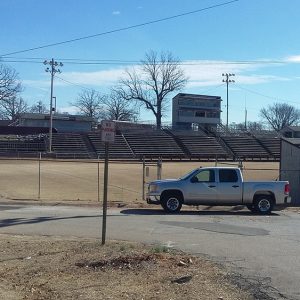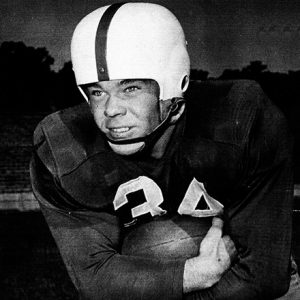calsfoundation@cals.org
Leon "Muscles" Campbell (1927–2002)
Lonnie Leon Campbell was one of Arkansas’s first post–World War II sports legends. In addition to being a star Razorback football player during the team’s formative years at the University of Arkansas (UA) in Fayetteville (Washington County), Campbell played for three professional football teams: the Baltimore Colts, Chicago Bears, and Pittsburgh Steelers. Campbell reportedly earned his nickname, “Muscles,” after bending a railroad spike with his hands. In 1946, he also played in the Razorbacks’ first Cotton Bowl game, against the Louisiana State University Tigers. Campbell was inducted into the Arkansas Sports Hall of Fame in 1977. In 1996, he was one of the first inductees into the Bauxite Hall of Fame, now on display in the Bauxite Historical Museum in Saline County.
Leon Campbell was born on July 1, 1927, in Bauxite (Saline County) to Lois and Jack Campbell. Jack worked for Alcoa as a carpenter and housing supervisor, while Lois stayed home with their six children. He graduated from Bauxite High School in 1946, having led the Bauxite Miner track team to two consecutive state championships.
After high school, Campbell turned down scholarship offers from both Tulane University in New Orleans, Louisiana, and the University of Kentucky in Lexington. Instead, he chose the University of Arkansas because assistant coach George Cole was also from Bauxite. As a Razorback, between 1946 and 1949, Campbell gained 1,335 yards on 295 carries. He rushed for 236 yards in the 1949 season opener against North Texas State in his senior year. This set a record for the Arkansas Razorbacks that was not broken until Dickey Morton ran for 271 yards in 1973. Razorback historians Orville Henry and Jim Bailey said, “Campbell was one of the great pure, instinctive football players of all time. He combined a tackle’s strength with a tailback’s speed and a linebacker’s agility.”
Campbell, who was Catholic, married Patricia Ann Gaylo, on July 30, 1949; they had six children. After graduating from UA in 1949, he was drafted by the Baltimore Colts in the second round of the National Football League (NFL) draft in 1950. In preparation for his run with the Colts, Campbell had a knee and hernia surgery at Johns Hopkins Hospital. He spent two years with the Colts but was forced to sit out the 1951 season after injuring his knee.
After that, he began playing for the Chicago Bears, where he spent the bulk of his professional career. Campbell stayed with the Bears from 1952 to 1954. It was during this period, in 1952, that he scored the only touchdown of his professional career, on a kickoff return. The following year, he played in all twelve games, where he gained 130 yards on 22 carries and caught five passes for 74 yards. In 1955, Campbell finished his career in professional football by playing for the Pittsburgh Steelers for a full year. He retired at the age of twenty-eight, having been plagued by knee injuries throughout his career. At the time of his retirement, Campbell had rushed 379 yards, had carried 102 times, and had made twenty receptions for 156 yards.
Campbell spent the next thirty years of his life working at Reynolds Metals Company’s Hurricane Creek Plant in Bauxite. However, he did “come out of retirement” for company football games. In the 1950s, people who worked at the Alcoa and Reynolds plants would form teams representing their place of employment and face off at C. W. Lewis Stadium in Benton (Saline County). This series of annual games was dubbed the “Aluminum Bowl” by company employees. The same name was used for an event in which two out-of-state teams played at War Memorial Stadium in Little Rock (Pulaski County) on December 22, 1956. Since the first Alcoa and Reynolds employee game took place a year before on Thanksgiving Day of 1955, locals later dubbed it the “Original Aluminum Bowl.” Campbell played for the Reynolds team as its star player in 1956, while Alcoa’s team had Jack “Spadjo” Richards of Benton, who had also played in the NFL.
These company football games ended abruptly after the third “Original Aluminum Bowl” took place on an extremely cold day on November 29, 1957, at C. W. Lewis Stadium. Campbell was forced to sit on the bench due to knee injuries. Because of the participants’ insistence on playing in the snow and ice, many of them received injuries of their own. Realizing that this could prove to be a liability for both Alcoa and Reynolds, the games were canceled from then on, bringing the tradition to an end. In 1991, Campbell was inducted into the University of Arkansas Sports Hall of Honor, and he was named to the All-Century Team in 1994.
On Memorial Day 1995, hundreds of retired Alcoa and Reynolds employees, including Campbell, and their families gathered at the Bauxite Historical Museum to see a short documentary, The Battle of Bauxite, about the wartime efforts in which many of them had taken part. Campbell was featured prominently in the film. He was inducted into the Bauxite Hall of Fame in 1996.
Campbell’s knees continued to plague him, and on September 2, 2002, he died after one of his routine knee surgeries at University Hospital in Little Rock. He is buried at Pinecrest Memorial Park’s Garden of Devotion near Collegeville (Saline County). In June 2016, Fox Sports Radio’s Andy Hodges listed Campbell on the Hogs Football list of “Favorite Razorbacks of All Time,” at number forty-one out of 100.
For additional information:
Burton, Freddy. “The Original Aluminum Bowl: Part II.” Saline Courier, October 13, 2013, p. 4B.
———. “The Original Aluminum Bowl: Part III.” Saline Courier, October 20, 2013. p. 4B.
“Double Surgery for Muscles Campbell.” Arkansas Gazette, January 30, 1950, p. 10.
Henry, Orville, and Jim Bailey. The Razorbacks: A Story of Arkansas Football. Huntsville, AL: The Strode Publishers, 1973.
“Leon “Muscles” Campbell.” Find-a-Grave.com. http://www.findagrave.com/cgi-bin/fg.cgi?page=gr&GRid=32402668 (accessed November 4, 2021).
Perkins, Pete. “‘Muscles’ a True Arkansas Force.” Arkansas Democrat-Gazette, September 4, 2002, p. 26.
Cody Lynn Berry
University of Arkansas at Little Rock
 World War II through the Faubus Era, 1941 through 1967
World War II through the Faubus Era, 1941 through 1967 C. W. Lewis Stadium
C. W. Lewis Stadium  Leon "Muscles" Campbell
Leon "Muscles" Campbell 



Comments
No comments on this entry yet.